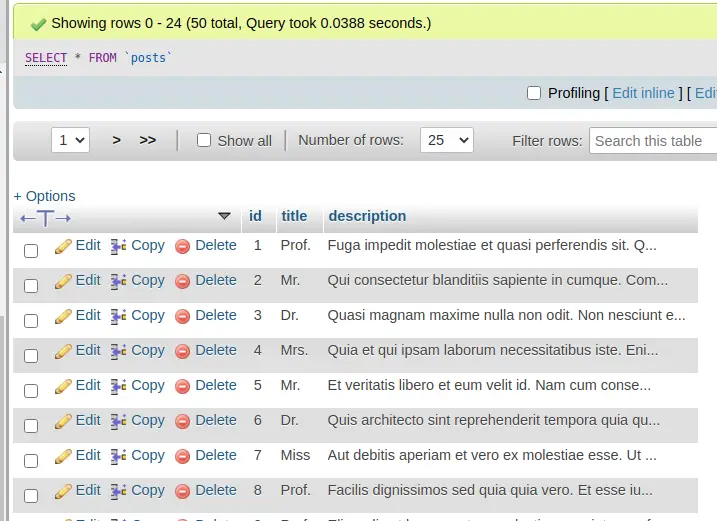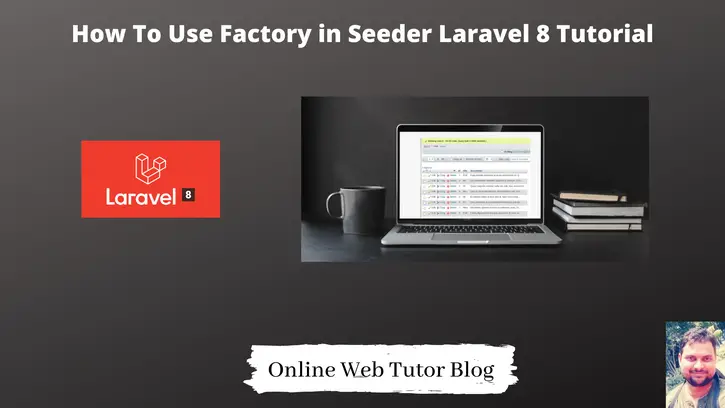Inside this article we will see the concept of Factory in seeder of laravel 8 tutorial. Using factory with faker library to seed fake data into database table.
This tutorial will be super easy to understand and easy to implement in your code. This tutorial will guide you to understand How to use factory in seeder laravel 8 tutorial. Factory is the feature of laravel artisan.
Learn More –
- How to Run Specific Seeder in Laravel 8 Tutorial
- Laravel 8 Database Seeding from CSV File Tutorial
- Laravel 8 Database Seeding from JSON File Tutorial
- Laravel 8 DataTable Ajax Pagination with Search And Sort
Let’s get started.
Laravel Installation
We will create laravel project using composer. So, please make sure your system should have composer installed. If not, may be this article will help you to Install composer in system.
Here is the command to create a laravel project-
composer create-project --prefer-dist laravel/laravel blog
To start the development server of Laravel –
php artisan serve
URL: http://127.0.0.1:8000
Assuming laravel already installed inside your system.
Create Database & Connect
To create a database, either we can create via Manual tool of PhpMyadmin or by means of a mysql command.
CREATE DATABASE laravel_app;
To connect database with application, Open .env file from application root. Search for DB_ and update your details.
DB_CONNECTION=mysql DB_HOST=127.0.0.1 DB_PORT=3306 DB_DATABASE=laravel_app DB_USERNAME=root DB_PASSWORD=root
Create Model & Migration
Open project into terminal and run this command to create model & migration file.
$ php artisan make:model Post -m
It will create two files –
- Model – Post.php at /app/Models folder
- Migration file – 2021_07_25_123805_2021_08_10_120110_create_posts_table at /database/migrations folder.
Open Migration file and write this complete code into it.
<?php
use Illuminate\Database\Migrations\Migration;
use Illuminate\Database\Schema\Blueprint;
use Illuminate\Support\Facades\Schema;
class CreatePostsTable extends Migration
{
/**
* Run the migrations.
*
* @return void
*/
public function up()
{
Schema::create('posts', function (Blueprint $table) {
$table->id();
$table->string("title", 50);
$table->text("description");
});
}
/**
* Reverse the migrations.
*
* @return void
*/
public function down()
{
Schema::dropIfExists('posts');
}
}Open model file Post.php and write this complete code into it.
<?php
namespace App\Models;
use Illuminate\Database\Eloquent\Factories\HasFactory;
use Illuminate\Database\Eloquent\Model;
class Post extends Model
{
use HasFactory;
public $timestamps = false;
}
Run Migration
Next, we need to create table inside database.
$ php artisan migrate
Create Factory
Next, we need to create a factory file in which we will use faker library which generates fake data.
$ php artisan make:factory PostFactory --model=Post
It will create a file PostFactory.php at /database/factories folder.
Open PostFactory.php and write this complete code into it.
<?php
namespace Database\Factories;
use App\Models\Post;
use Illuminate\Database\Eloquent\Factories\Factory;
class PostFactory extends Factory
{
/**
* The name of the factory's corresponding model.
*
* @var string
*/
protected $model = Post::class;
/**
* Define the model's default state.
*
* @return array
*/
public function definition()
{
return [
'title' => $this->faker->title,
'description' => $this->faker->text,
];
}
}Create Seeder
Next, we need to create a seeder file.
$ php artisan make:seeder PostSeeder
It will create a file PostSeeder.php at /database/seeders folder.
Open PostSeeder.php and write this complete code into it.
<?php
namespace Database\Seeders;
use Illuminate\Database\Seeder;
use App\Models\Post;
class PostSeeder extends Seeder
{
/**
* Run the database seeds.
*
* @return void
*/
public function run()
{
Post::factory()->count(50)->create();
}
}Data Seeding
Open project into terminal and run this artisan command
$ php artisan db:seed --class=PostSeeder
It will seed countries data into table.

We hope this article helped you to learn How To Use Factory in Seeder Laravel 8 Tutorial in a very detailed way.
If you liked this article, then please subscribe to our YouTube Channel for PHP & it’s framework, WordPress, Node Js video tutorials. You can also find us on Twitter and Facebook.
